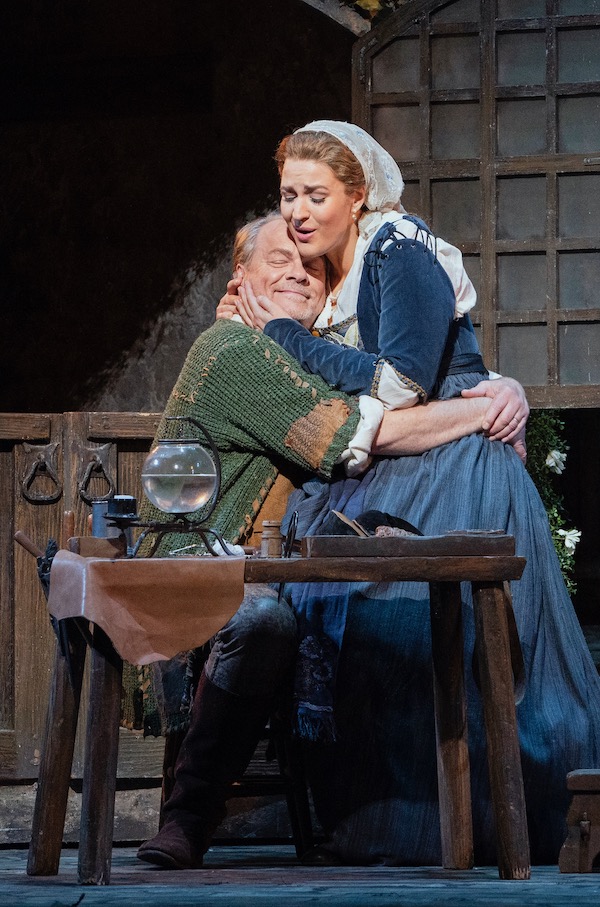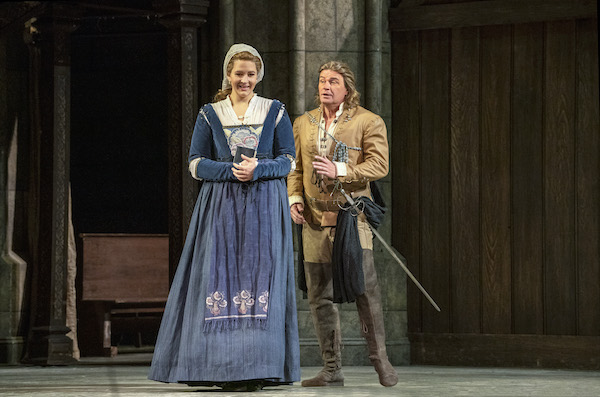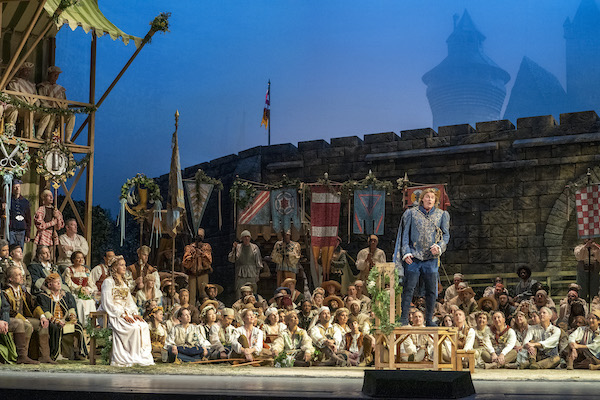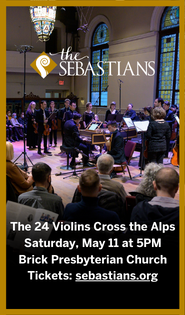Met’s epic “Meistersinger” sends a message of confidence and hope

Coronavirus be damned, the Metropolitan Opera mounted the longest opera in the standard repertoire Tuesday night, cramming its stage with people singing at the top of their lungs, while music lovers sat together and watched for nearly six hours.
Besides its spectacle and gorgeous choruses, Wagner’s Die Meistersinger von Nürnberg came with a mid-pandemic message: Through art, we will survive.
It’s true that in saying so, Wagner, through his mouthpiece the cobbler-poet Hans Sachs, was referring to German culture, beset on all sides (as the composer saw it) by French, Italian, and Jewish influences. But in his crabbed, mean-spirited way, he somehow managed to create a work that can raise spirits in all times of trouble.
In the revival that opened Tuesday, the 1997 production by Otto Schenk is still straight-up Wagner, right down to the composer’s stage directions. Günther Schneider-Siemssen’s realistic sets transport the viewer to medieval town street and shop. Rolf Langenfass dresses cast and chorus for work and festival (and bedtime too, in the riotous Act II finale). Gil Wechsler casts natural-looking light over it all, most notably the rising sun that spotlights Sachs in his shop.
And by the way, there is a plot, and characters, and singers to portray them—in Tuesday’s case, an international cast of experienced Wagnerians, with widely varying vocal and acting styles.
The comic-opera plot that Wagner originally proposed to his publisher as quick to write, easy to produce, and a quick money-maker was simple enough: Boy meets girl, boy enters singing contest, boy (with help from his cobbler-mentor) wins contest and girl.
Over the next six years, as the composer read Schopenhauer and other writers on the meaning of music and art, the opera expanded, and with it the role of Sachs as a kind of populist philosopher, musing at length on how, through inspiration and discipline, music can quell the Wahn (madness) of everyday life.
Baritone Michael Volle, a veteran interpreter of this key role, brought a clear, forward-placed, intelligent and intelligible voice both to his long soliloquies and his interactions with other singers. Genial in the early going, crafty and inscrutable as the plot thickened later, Volle’s Sachs dominated the scene not by vocal power but by the finest-grained acting of the night.
At least until his slapstick performance in the climactic singing contest, baritone Johannes Martin Kränzle also gave a realistic and even sympathetic spin to the comic foil Beckmesser. One believed he believed that he was saving German art with his piles of arbitrary rules for writing a song, and that he could win the contest and the girl with his off-key, Italianate warbling.

As the young lovers, tenor Klaus Florian Vogt and soprano Lise Davidsen were seriously mismatched vocally, making one grateful this opera did not include a love duet. Vogt’s reedy tone and stressful high notes as the knight Walther may be charitably interpreted as depicting callow youth. Also, his usually hunched posture did not fit the chorus’s description of him as “proud and bold.” (Even the character’s family name, von Stolzing, derives from the German word for “proud.”)
In contrast, Davidsen as the demure bride-to-be sometimes cut loose with hall-filling high notes far bigger than any other singing that night. She also proved capable of modulating her massive instrument, as when she began the exquisite Act III quintet in a covered yet rich pianissimo (before blowing away the other four singers in the final crescendo). It may seem perverse to complain about a Wagnerian soprano at the Met being too loud, but when it throws the music out of balance, some adjustment seems called for.
It would have been up to conductor Antonio Pappano—in his first Met appearance in 25 years—to make that adjustment. While he didn’t do that, he did do a good job weaving Wagner’s comic and sentimental moods under all the dialogue and occasional action. The famous Prelude to Act I took a few pages to come together, but eventually made a festive sound down in the pit. And the Prelude to Act III was pure gossamer.
Thanks to thorough preparation by chorus master Donald Palumbo, the opera’s many choral passages, whether turbulent (Act II finale) or festive (the contest scene) represented the deutsche Volk with rich tone and clear articulation.
A standout in other roles was Georg Zeppenfeld as Pogner, Eva’s father, whose clear, burnished bass and supple phrasing in Act I made one wish his character had been given more to do.
Mezzo-soprano Claudia Mahnke (in her Met debut) and tenor Paul Appleby gave bright-toned and lively performances as another romantic pair, Eva’s attendant Magdalene and Sachs’s apprentice David.
And the authoritative tones of bass-baritone Alexander Tsymbalyuk as the Nightwatchman, pronouncing his benediction on the town, made one wish to live in a time and place where one heard such singing every hour all night long.
This Meistersinger did not go on all night, but it made a good stab at it, from the first bars of prelude a little after 6 p.m. to fortissimo and final curtain at 11:50—a major flexing of the Met’s production muscles in the face of a health crisis, with a philosophical message to match.
Die Meistersinger von Nürnberg runs through November 14. metopera.org; 212-362-6000.








